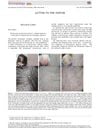 3 citations,
April 2018 in “Cosmetics”
3 citations,
April 2018 in “Cosmetics” As people get older, they have less active hair growth, but women have thicker hair than men and respond better to hair loss treatments.
 October 2020 in “Veterinary Dermatology”
October 2020 in “Veterinary Dermatology” New treatments and diagnostic methods for various animal skin conditions showed promising results.
 July 2024 in “Pharmaceutics”
July 2024 in “Pharmaceutics” The new hydrogel treatment promotes faster hair growth and better skin health for hair loss.
 31 citations,
June 2011 in “Movement Disorders”
31 citations,
June 2011 in “Movement Disorders” The document describes a woman with familial Parkinson's disease due to a genetic mutation, showing severe symptoms and poor response to treatment, and suggests finasteride may help reduce symptoms in Tourette syndrome.
 April 2018 in “Journal of Investigative Dermatology”
April 2018 in “Journal of Investigative Dermatology” Acne patients' skin, both with and without lesions, shows a strong immune response and higher antimicrobial activity.
1 citations,
November 2022 in “International journal of molecular sciences” Human fetal placental stromal cell injections speed up healing and improve skin and hair recovery after radiation damage.
 24 citations,
January 2014 in “The American Journal of Chinese Medicine”
24 citations,
January 2014 in “The American Journal of Chinese Medicine” The leaves of Platycladus orientalis have potential health benefits but require more research for safety and understanding how they work.
 December 2024 in “Research Journal of Pharmacy and Technology”
December 2024 in “Research Journal of Pharmacy and Technology” Androgenic alopecia is mainly caused by DHT, and new treatments focus on hair regeneration and aging factors.
August 2024 in “Pharmaceuticals” Oral sturgeon oil promotes hair growth and improves gut health.
 April 2017 in “Journal of Investigative Dermatology”
April 2017 in “Journal of Investigative Dermatology” The document concludes that various topical treatments show promise for skin conditions like atopic dermatitis, psoriasis, and hair loss.
 49 citations,
March 2014 in “Journal of Investigative Dermatology”
49 citations,
March 2014 in “Journal of Investigative Dermatology” Using the drugs AMD3100 and Tacrolimus together greatly improves skin healing and hair growth after a deep skin cut by increasing stem cells in the wound.
 10 citations,
July 2022 in “Journal of Medicinal Chemistry”
10 citations,
July 2022 in “Journal of Medicinal Chemistry” Adding a second method to PROTACs could improve cancer treatment.
 1 citations,
February 2017 in “Journal of gynecology and womens health”
1 citations,
February 2017 in “Journal of gynecology and womens health” The document concluded that more research is needed to understand how estrogen affects the enzyme involved in hirsutism development.
 August 2023 in “International Journal of Molecular Sciences”
August 2023 in “International Journal of Molecular Sciences” The new hydrogel with zinc and polysaccharides improves wound healing and has antibacterial properties.
 4 citations,
December 2023 in “Advanced science”
4 citations,
December 2023 in “Advanced science” New injectable hydrogels with gelatin, metal, and tea polyphenols help heal diabetic wounds faster by controlling infection, improving blood vessel growth, and managing oxidative stress.
 1 citations,
April 2017 in “Journal of Investigative Dermatology”
1 citations,
April 2017 in “Journal of Investigative Dermatology” SM04554 may increase hair growth as a topical treatment for androgenetic alopecia.
 October 2023 in “Naunyn-Schmiedeberg's Archives of Pharmacology”
October 2023 in “Naunyn-Schmiedeberg's Archives of Pharmacology” Custom software found that common allergy drugs might have new uses for various conditions and could improve survival in some cancers.
 July 2021 in “Australasian Journal of Dermatology”
July 2021 in “Australasian Journal of Dermatology” The trichoscopy-assisted hair pull test is useful for diagnosing different types of hair loss.
 2 citations,
May 2021 in “bioRxiv (Cold Spring Harbor Laboratory)”
2 citations,
May 2021 in “bioRxiv (Cold Spring Harbor Laboratory)” A special foam called EG7 PTK-UR helps heal skin wounds better than other similar materials, working as well as a top-rated product and better than a polyester foam.
 23 citations,
July 1993 in “Pharmacotherapy”
23 citations,
July 1993 in “Pharmacotherapy” Finasteride treats enlarged prostate and baldness, but may cause limited urinary improvement and sex-related side effects.
 October 2024 in “Journal of Education Health and Sport”
October 2024 in “Journal of Education Health and Sport” Alopecia areata treatment should be personalized, using topical or systemic therapies based on severity, with promising options like JAK inhibitors needing more research.
 January 1989 in “Side effects of drugs annual”
January 1989 in “Side effects of drugs annual” Some cancer and immune system drugs can cause serious side effects, including heart, lung, nerve, and organ damage, which need careful monitoring and management.
 1 citations,
May 2022 in “Scientific African”
1 citations,
May 2022 in “Scientific African” Oleogels made from Cedarwood and Rosemary oils can enhance hair growth, but combining both oils doesn't increase the effect.
18 citations,
January 2010 in “Dermatology Research and Practice” DPCP treatment for alopecia areata can sometimes cause vitiligo.
 35 citations,
May 2012 in “Cochrane Database of Systematic Reviews”
35 citations,
May 2012 in “Cochrane Database of Systematic Reviews” Minoxidil effectively treats female pattern hair loss.
 5 citations,
January 2017 in “Journal of Nanomedicine & Nanotechnology”
5 citations,
January 2017 in “Journal of Nanomedicine & Nanotechnology” Nanoemulgel could be a promising new treatment for hair loss.
 1 citations,
June 2023 in “Genes”
1 citations,
June 2023 in “Genes” Hair loss from Alopecia Areata is caused by both genes and environment, with several treatments available but challenges in cost and relapse remain.
 51 citations,
January 2004 in “Skin Pharmacology and Physiology”
51 citations,
January 2004 in “Skin Pharmacology and Physiology” The document explains hair growth and shedding, factors affecting it, and methods to evaluate hair loss, emphasizing the importance of skin biopsy for diagnosis.
 February 2024 in “ACS Omega”
February 2024 in “ACS Omega” The Shen Bai Hair Growing Decoction may help treat hair loss by promoting hair growth and reducing inflammation.
 26 citations,
December 2021 in “Regenerative Biomaterials”
26 citations,
December 2021 in “Regenerative Biomaterials” The hydrogel speeds up skin wound healing and helps regenerate tissue.


























